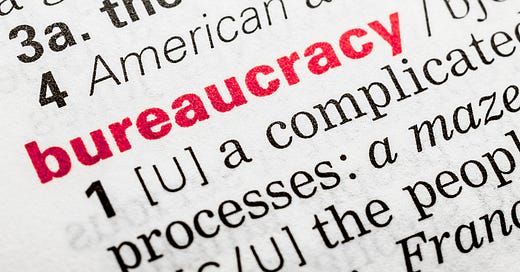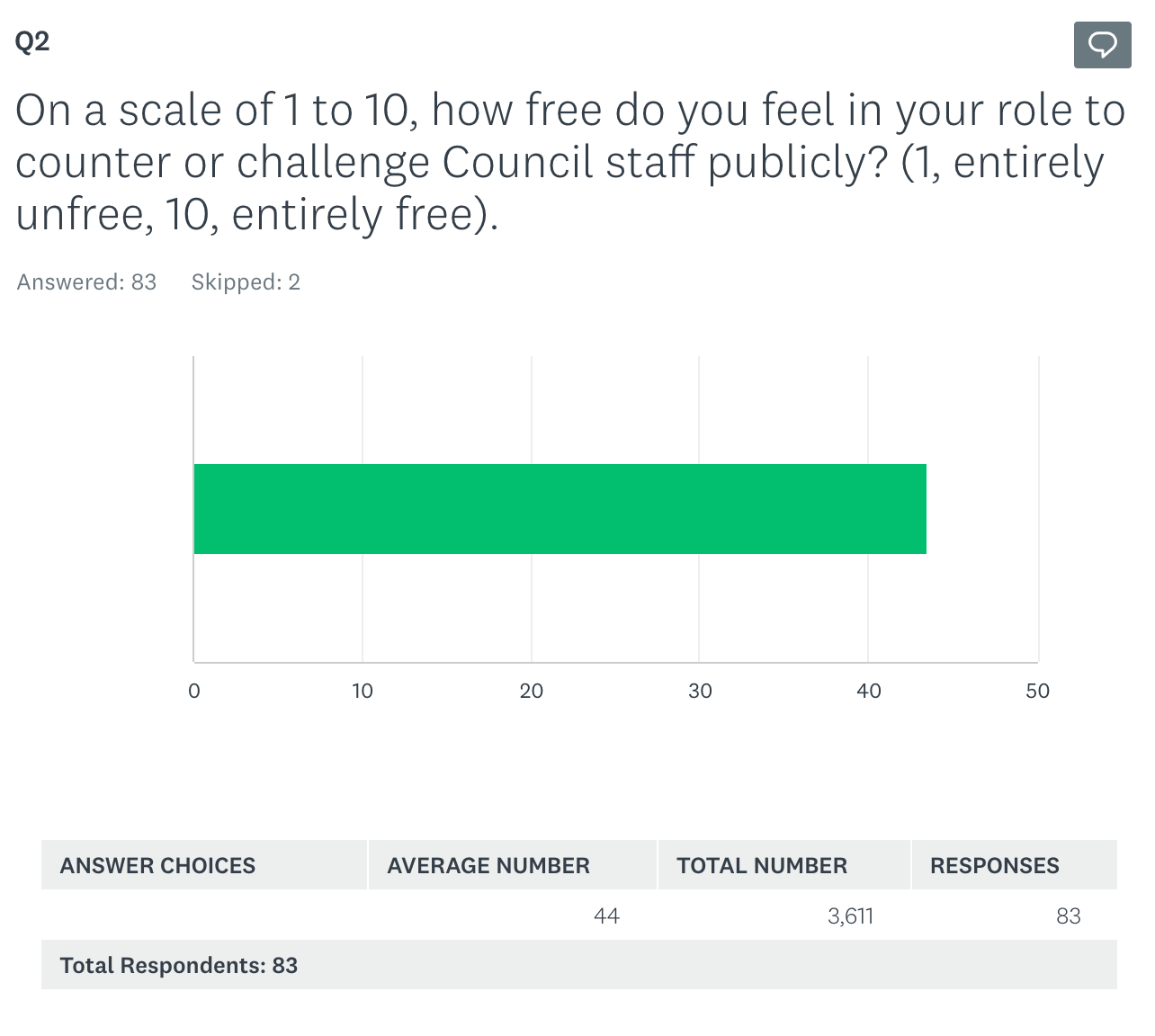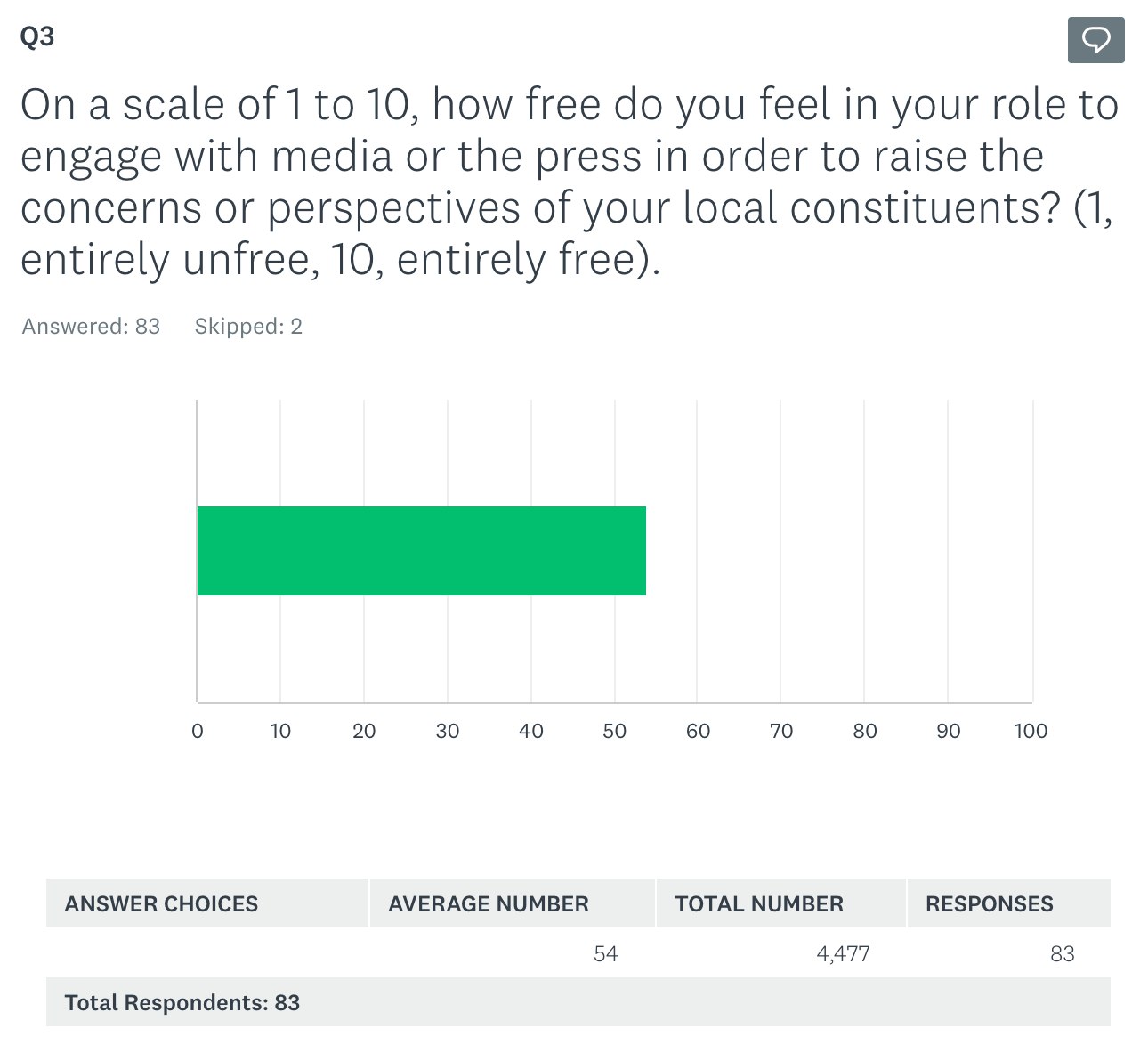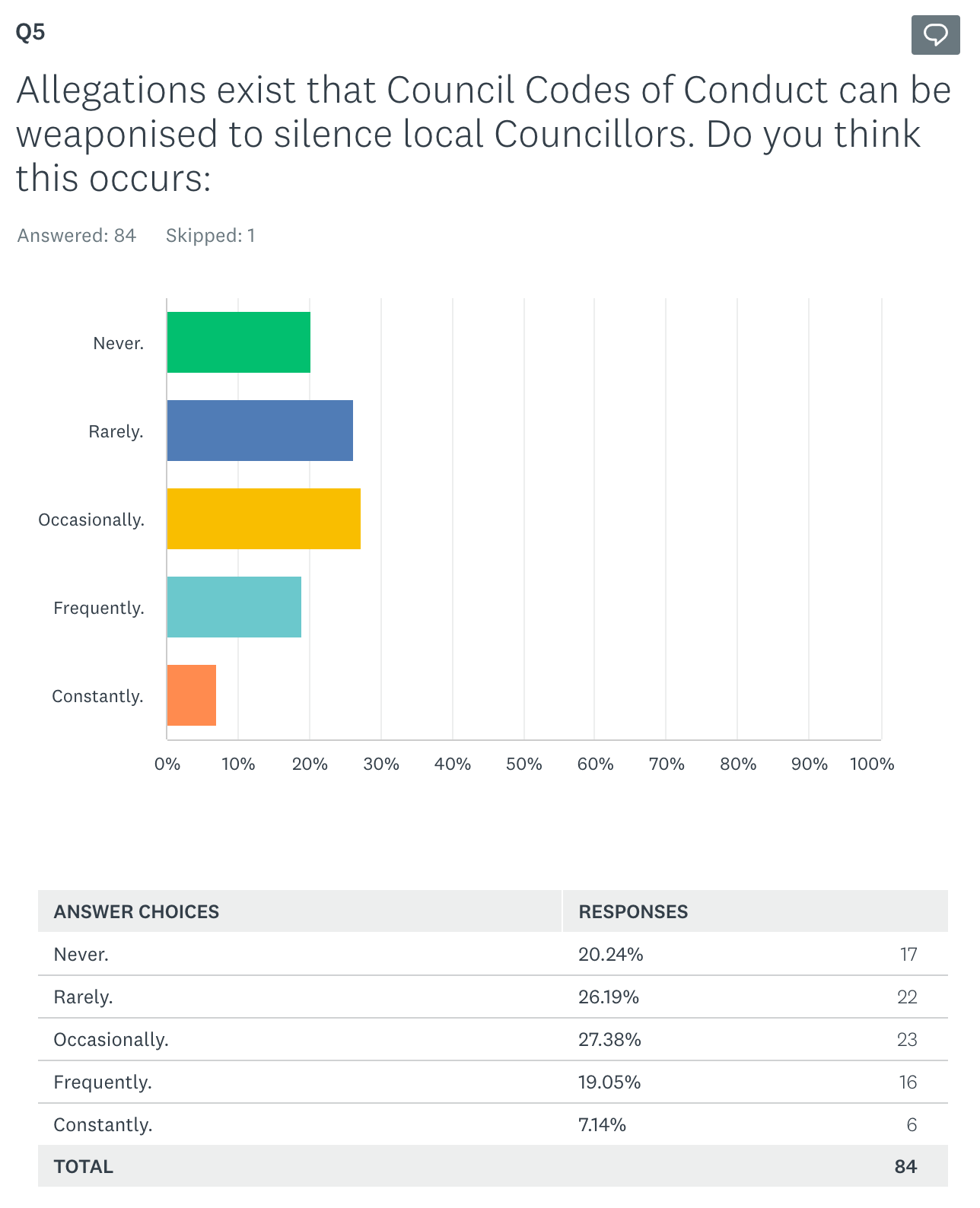Dysfunction and dissatisfaction appear to pervade many local government councils at the moment. Increasingly, the blame for this is accumulating around the role of the bureaucracy – the unelected officials and consultants, who stand accused of overstepping their mark and becoming the real decision-makers in local democracy.
In numerous councils around the country, elected councillors complain that the council officials, and often their council’s chief executive, have usurped the power to make decisions or at least come to dominate the elected councillors in their decision-making. This is a fundamental problem for the principles of democracy, in which the bureaucracy is supposed to serve those with the elected mandate.
A Survey of what elected counsellors think
The Free Speech Union has polled local government politicians to gauge some of the issues and find out to what extent this is a problem. They released the results today, which back up the various anecdotal stories showing that democracy is being undermined.
Of the five questions they ask councillors, the most important one in this regard is: “How free do you feel in your role to counter or challenge Council staff publicly?”. Answering this on a 1-10 scale, in which 10 means entirely free, the average answer was 4.4 out of 10. This suggests that there is indeed a real problem. See the response below:
Other questions in the survey also illustrate the problem. Councillors were asked how free they felt to engage with media “to raise the concerns or perspectives of your local constituents”, with the average answer being 5.4 out of 10. See below:
Councillors around the country also often claim that officials are reprimanding them for breaking council “code of conduct” agreements. Officials are allegedly using these codes of conduct as a means to control the politicians. Therefore, the Free Speech Union survey asked if the codes of conduct are being “weaponised to silence local councillors”. In response, 54 per cent of councillors said that this happened either occasionally, frequently, or constantly, and only 20 per cent of council respondents said that this never happened. See the full results below:
The full survey results of the Free Speech Union survey of councillors can be seen here: Free Speech Union survey of Local Government
The Wellington City Council schisms
The problems of bureaucracy are most prominently seen at the Wellington City Council, where Mayor Tory Whanau works very closely with the chief executive, Barbara McKerrow, who is increasingly acknowledged as the most powerful actor at the Council.
On Tuesday, I outlined the latest schism on the Council, which could have some significant consequences – see: The Left split from Tory Whanau’s wayward Wellington City Council
The gist of this is that the three most leftwing councillors have revolted against the leadership of the Mayor, arguing that she has been captured by the agenda of council officers. One of the dissident councillors, Ben McNulty, claims: “Council’s officers say: ‘Jump,’ and the response of the mayor’s office is to say ‘How high?’”. Another, Nureddin Abdurahman: “The mayor is not leading, the bureaucracy is governing us”.
The three councillors and others have also objected to how officials allegedly manipulate and block information within the council, which they say is contributing to disastrous decision-making. They also argue that this “information blockade” is reinforced by a new code of conduct that the CEO introduced last year in which officials won’t supply information to the politicians unless it pertains to upcoming decisions. This has been best covered in The Post by Andrea Vance – see: New code restricting advice to councillors is “unlawful and unconstitutional” (paywalled)
She reports that public law scholar Dean Knight of Victoria University's law school says the code is “unlawful and unconstitutional” and “democratically problematic.”
Knight elaborates on the problem: “The idea that the chief executive gets to make the call on what the councillors on the governing body see tips the institutional relationship upside down… The chief executive is not elected, nor directly accountable to the public. The chief executive serves councillors, not the other way around. Just imagine the uproar if officials in central government agencies started blocking requests from Cabinet and their ministers about matters relating to their portfolios.”
In an opinion piece, Andrea Vance explains that this is a problem throughout the country, but especially visible in Wellington at the moment, due to controversial decisions made by the council: “In Wellington, a succession of poor decisions have been accompanied by a troubling mix of confusion and poor grasp of details by councillors. That’s not their fault. From the water crisis, to the Town Hall cost blow-out, a reckless Reading Cinema deal, and now the sale of airport shares, councillors were either kept in the dark, asked to withhold information from the public, or provided with one-sided advice” – see: What happens when politicians no longer trust their officials? (paywalled)
Today, the Minister of Local Government, Simeon Brown, has sided with the critics on Council, condemning McKerrow’s actions, stating “The CEO is acting like a politician when she should be acting like the CEO, and the politicians should have access to the information that they need” and “CEOs need to ensure that they respect the fact that mayors and councillors are elected, and they are not” – see Thomas Manch and Andrea Vance’s news report, Minister Simeon Brown ‘appalled’ by Wellington City Council withholding information (paywalled)
This article reports that the Minister sees this as a broader issue than just Wellington Council and has requested more information from the Department of Internal Affairs on the state of the problem and what can be done about it.
The Problem elsewhere in the country
Much of the Wellington debates about the role of officials revolve around their push to get councillors to sell Wellington’s shares in the local airport. Similar situations have been occurring in other councils around the country – notably Christchurch (which decided against privatisation), Bay of Plenty (in terms of the council’s ownership of the Port of Tauranga), and now in Auckland the issues are becoming fraught and fought over.
The Auckland Council sold a large chunk of its shares in Auckland Airport last year after Australian consultants advised councillors to do so. But two councillors—Mike Lee and John Watson—are now questioning the advice they received and have asked the Auditor General to investigate what they claim is an arrangement that breaches the Local Government Act.
The council has paid Flagstaff Consulting Group over $3.5m for advice on asset sales, including a $1.4m payment for advice on the airport shares. Lee and Watson have written to the Auditor General, saying “In relationship to the sale of Auckland International Airport shares, the main information provided to councillors from Flagstaff was a verbal briefing by Flagstaff executives on 31 May 2023 which frankly amounted to a heavy-handed pitch to sell the shares.”
The councillors claim that the advice, commissioned by officials, was not objective because the financial arrangement with the consultancy was one in which they only got paid a fixed fee if the council agreed to sell the shares. Lee and Watson have told the Auditor General that the payment was, therefore, a “clear financial inducement to achieve a predetermined outcome”.
This is all best covered by Andrea Vance in the most recent Sunday Star Times – see: Were Aussie consultants paid a $1.4m bonus for advice favourable to airport sale? (paywalled)
In Christchurch, there’s been a long-running battle for control between senior staff and elected councillors. Last year, Mayor Phil Mauger even said that staff were “running amok” and needed to be “reined in”. This caused local Newstalk ZB observer of the Council, John MacDonald, to comment: “For a long time now, I’ve been of the belief that while mayors and councillors might like to think they’re running the place - they’re not. And it’s the council staff who really run the place”.
MacDonald was critical of the elected politicians for letting staff get away with it, saying that the good councillors make themselves unpopular with staff by asking “challenging questions”, but generally “the council staff get away with what they want to get away with” – see: We all know who's really in charge of local councils
The situation of unelected bureaucrats running a council is at its most extreme in Tauranga. In 2021, the Labour Government sacked the elected council and mayor and appointed former National minister Anne Tolley and two others to run the city instead. But new elections will finally be held next month, restoring democracy.
As outgoing Commission Chair, Tolley gave an interview on Sunday in which she argued that she and her colleagues should be allowed to stay on in their role on the council in Tauranga’s transition back to democracy. You can watch the TVNZ interview with Jack Tame here: Tauranga commissioner on returning candidates: ‘Wouldn't vote for them’
Furthermore, Tolley advocated that a “hybrid model” of governance could be extended to all other councils in the country: “I believe that's where we should be heading for all local government… Maybe two-thirds of the council is elected, but to have that professional governance — people who understand the difference between governance and operations, who can bring in expertise”.
Contentiously, Tolley also pleaded for Tauranga voters not to elect “those old guys” who were on the previous council. In lending her weight to the campaigns of the new candidates, Tolley—who is also the chair of integrity watchdog Transparency International New Zealand—appears to have abused her ostensibly neutral position to play politics, influencing the upcoming election.
Local government’s “Professional Managerial Class”
To explain how officials have dominated local councils, it’s worth considering the academic theory of the “Professional Managerial Class”, which is increasingly seen as an excellent way to understand modern politics and society. The “Professional Managerial Class”, or PMC, is that group of middle class, highly paid, and highly-educated, urban professionals who are generally viewed as “progressives” and increasingly control most elements of public life (alongside the public service, media, universities, Parliament, business, etc).
It could be argued that local government is simply the latest institution that the PMC has come to dominate. As per usual, it has done so by bureaucratic means rather than democratically. Hence, local councils are now one of the main staffing places for those who want to progressively engineer social change.
Many are certainly highly paid. Journalist Susan Edmunds has recently looked at the incomes of local authority officials, discovering that “More than 10,000 council staff across the country earn more than $100,000 a year, and in many councils more than 20% of the staff earns six figures” – see: Which council staff are earning more than $100,000? (paywalled)
According to research, nearly half the staff at the Wellington Regional Council earn over $100,000, but the council with the highest number of these high earners was Auckland, which had 3742 such staff. Some provincial councils also have incredibly high salaries – “Rotorua Lakes Council had the highest median salary for managers, $188,467.” And throughout the country in local government, “At least 742 staff received more than $200,000 a year.”
Leftwing political commentator Chris Trotter wrote about the dominance of local government PMC, painting a picture of a topsy-turvy world that could be one straight out of the 1980s BBC political satire Yes Minister: “our district and city councillors are democratically elected to govern their communities on one very strict condition – that they never, ever, under any circumstances, attempt to do so” – see: The Illusion of Power: How Local Govt Bureaucrats Overawe Democratically-Elected Councillors
The column has created quite a debate in local government circles, with Auckland Councillor Mike Lee posting Trotter’s piece on social media, saying, “I am not making any comments except to fully confirm very sadly the essential truth of this analysis.” Lee also backs the call for reform of local government – Trotter suggests that the Government should “legislate to outlaw any and all attempts by local government bureaucrats and/or contractors to intimidate, threaten, or by any other means overawe, those elected to serve the public interest, and enforce the people’s will.”
On this, former Christchurch mayor Garry Moore has also joined the fray, saying about this and the Wellington controversy: “It's time for a rewrite of the Local Government Act to remove the power of the executive. It is fundamental that NEVER should an elected rep be denied any Council report. It is totally against the spirit of the LGA to deny any information like what has been requested.”
For a longer-term history of how successive central governments have eroded the power of local politicians, see this analysis published on the leftwing blog site, The Standard: National and the Gutting of Local Democracy
Here’s the conclusion: “New Zealand is now one of the least-governed, least accountable, most centralised political orders in the developed world. Successive governments both Labour and National have made it consistently worse. The only body that regulates the performance of councils is Internal Affairs, who in turn have no democratic input and answer solely to their Minister. Worse, local government used to be a place where people were heard enough to make a real change. Now most have lost faith in their capacity, since Councils have influence over a very, very narrow range of activities.”
Finally, Auckland city councillor Mark Thomas wrote last week about how dysfunctional local government has become, including the problem that “transparency around council decision making is low and needs improving, together with much better engagement with citizens”.
He points out that the health of local government is vitally important to how New Zealand functions – collectively, it has annual revenues of $11b and an asset base of $130b – but that despite endless reviews and reports that get commissioned about fixing local democracy, nothing ever changes – see: NZ’s maddening local government
Dr Bryce Edwards
Political Analyst in Residence, Director of the Democracy Project, School of Government, Victoria University of Wellington









Thanks to this Substack to reveal these undemocratic shenanigans. Wouldn’t it be lovely if we had a fourth estate to bring this news to the fore.
The comment about "Yes Minister!" is the one I have been thinking since you first brought this up in the newsletter a few days ago. In a much more minor way, for decades I have been in the role of the admin person who provides the elected or appointed person at the top with support - doing research, preparing reports etc. I would NEVER withhold reports & other information from someone who has to make decisions that can be far-reaching, no matter what I thought of their competence or political views. You always hope & expect that if they have the full range of facts & advice that they (and others involved) will come to the right decision for the circumstances. If not, it is on THEM because you have given them every opportunity. The people who elect them/appoint them/employ them can terminate them for unacceptable & wifully wrong decisions, but they have a defence if they were not provided with the information in the first place?
Sadly there is too little real understanding between "governance & operations" in many organisations from small to large, which not only result in poor decisions if information is withheld from decision makers, but also cause tensions & discourage good people for standing for governance positions when they get the ire of the people they represent, but feel they are powerless to make the changes needed.
Thanks for covering this & linking to others doing the same.